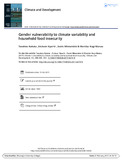| dc.description.abstract | Climate variability presents different challenges for men and for women in their efforts to ensure household food security. However, despitetheircentralrole, genderissueshavereceivedonly cursoryattentioninadaptation studies.Thisarticle looksat causes of gender vulnerability to climate variability and household food insecurity in one sub-Saharan African country: Malawi. Data were collected through a household questionnaire survey, focus group discussions and key informants’ interviews in Chikhwawa and Ntcheu districts, located in the southern and central areas of Malawi. Results revealed that exposure and sensitivity to climate risks vary between men and women; therefore, each gender responds differently to climate risks, with men having more opportunities than women. The results highlight the need for policies and interventions to empower women in the access to resources that can strengthen households’ resilience to climate variability. | en_US |

